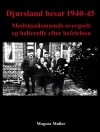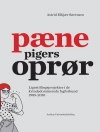The communist German Democratic Republic, founded in 1949 in the Soviet-occupied zone of post-war Germany is, for many people, epitomized by the Berlin Wall; Soviet tanks and surveillance by the secret security police, the Stasi, appear to be central. But is this really all there is to the GDR¹s history? How did people come to terms with their situation and make new lives behind the Wall? When the social history of the GDR in the 1960s and 1970s is explored, new patterns become evident. A fragile stability emerged in a period characterized by ‘consumer socialism’, international recognition and détente. Growing participation in the micro-structures of power, and conformity to the unwritten rules of an increasingly predictable system, suggest increasing accommodation to dominant norms and conceptions of socialist ‘normality’. By exploring the ways in which lower-level functionaries and people at the grass roots contributed to the formation and transformation of the GDR from industry and agriculture, through popular sport and cultural life, to the passage of generations and varieties of social experience the contributors collectively develop a more complex approach to the history of East Germany.
Daftar Isi
Acknowledgements
Introduction: The Concept of ‘Normalisation’ and the GDR in Comparative Perspective
Mary Fulbrook
PART I: NORMALISATION AS STABILISATION AND ROUTINISATION? SYSTEMIC PARAMETERS AND THE ROLES OF FUNCTIONARIES
Chapter 1. ‘Aggression in Felt Slippers’: Normalisation and Western Covert Activities in the Context of Détente and Ostpolitik
Merrilyn Thomas
Chapter 2. Economic Politics and Company Culture: The Problem of Routinisation
Jeannette Madarász
Chapter 3. The Professionalisation of Agriculture: Functionaries on the Land
George Last
Chapter 4. The Societalisation of the State: Sport for the Masses and Popular Music
Dan Wilton
Chapter 5. Communication and Compromise: The Prerequisites for Cultural Participation
Esther von Richthofen
Chapter 6. Local Functionaries and Renegotiations of Heimat
Jan Palmowski
PART II: NORMALISATION AS INTERNALISATION? CONFORMITY, ‘NORMALITY’ AND ‘PLAYING THE RULES’
Chapter 7. Practices of Survival – Ways of Appropriating ‘the Rules’: Reconsidering Approaches to the History of the GDR
Alf Lüdtke
Chapter 8. The GDR – A Perfectly Normal Country, in the Centre of Europe
Ina Merkel
Chapter 9. How Do the 1929ers and the 1949ers Differ?
Dorothee Wierling
Chapter 10. Producing the ‘Socialist Personality’? Socialisation, Education and the Emergence of New Patterns of Behaviour
Angela Brock
Chatper 11. 1977: The Most Normal Year of the GDR?
Mark Allinson
Notes on contributors
Bibliography
Index
Tentang Penulis
Educated at Cambridge and Harvard, Professor Mary Fulbrook is Dean of the Faculty of Social and Historical Sciences at UCL (University College London) and a Fellow of the British Academy.She is the author of numerous books, including: overviews such as A Concise History of Germany and A History of Germany 1918–2008: The Divided Nation; as well as seminal works on the GDR, such as Anatomy of a Dictatorship: Inside the GDR and The People’s State: East German Society from Hitler to Honecker, as well as Dissonant Lives: Generations and Violence through the German Dictatorships; and works on Historical Theory and German National Identity after the Holocaust. Her most recent book is the prize-winning A Small Town near Auschwitz: Ordinary Nazis and the Holocaust.











